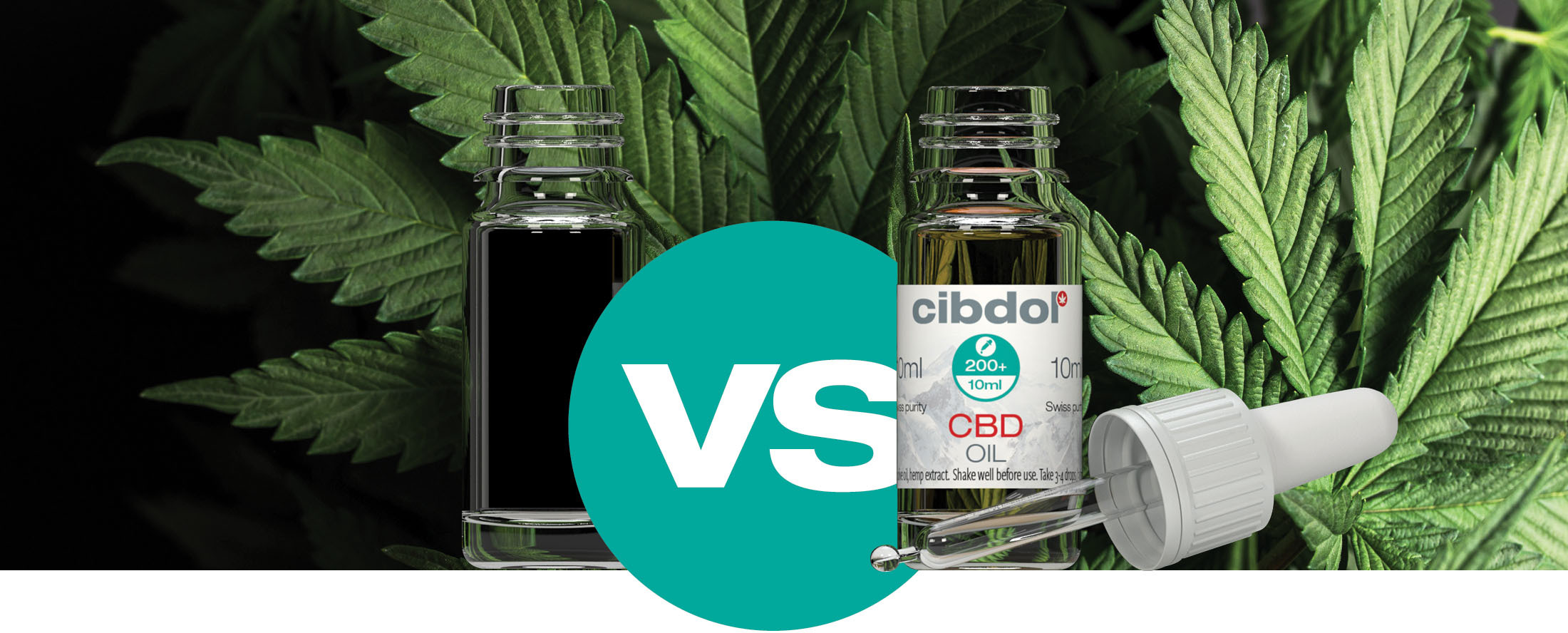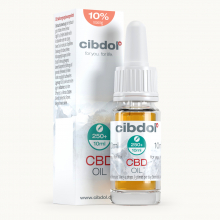Cannabis oil: what you need to know

Cannabis oil is derived exclusively from marijuana, a type of cannabis known for its psychotropic effects. However, it's common for cannabis oil to be confused with CBD oil, and vice versa.
To find out what you need to know about cannabis oil, keep reading.
Contents:
What is cannabis oil?
Cannabis oil is a type of concentrate that contains significant levels of THC. Although it can also contain other cannabinoids and terpenes, the primary appeal of cannabis oil is its psychotropic effect.
Psychotropic: “Denoting drugs that affect a person’s mental state”
To understand where cannabis oil comes from, it helps to briefly explain the classification of the Cannabis sativa genus (C. sativa).
Most people talk about cannabis as a loose term that applies to all species of the plant. However, there are many subtypes of Cannabis sativa that differ not only in their appearance, but their chemical structure[1] too.

The difference between hemp and marijuana
Hemp is a selectively bred variant of C. sativa that is low in THC—making it the ideal candidate for CBD oils.
Marijuana, on the other hand, refers to cultivars of C. sativa bred mainly for their abundance of THC[2].

Tetrahydrocannabinol (THC) is the psychotropic cannabinoid known for producing a high when smoked, vaped, or otherwise ingested.
Cannabis oils come exclusively from marijuana, not hemp, and therefore have a very different effect on the human body.
Instead of working alongside your endocannabinoid system to promote balance, cannabis oils bind directly to receptors in the brain, causing a windfall of temporary psychological changes.

How cannabis oil works
As we've highlighted, the determining factor of cannabis oil is its high concentration of THC. Like other cannabinoids, THC influences the body via receptors connected to the endocannabinoid system (ECS), with a particular affinity for CB1 receptors.
CB1 receptors are most concentrated in the brain, spinal cord, and parts of the digestive system.
Rather than gently activating receptors in these locations, THC overloads them, leading to:
• Slowed reaction time
• Euphoria
• Increased appetite
• Impaired coordination
• Impaired memory
• Altered mental state
The impact of THC has made marijuana one of the most widely used illicit substances in the world. But, as you can see, the potential for adverse effects makes THC largely unsuitable as a daily supplement for well-being.
How is cannabis oil made?
The production process for cannabis oil is remarkably similar to CBD oil. Both involve extracting cannabinoids from raw plant material, before adding active ingredients to a carrier oil.
However, in the case of cannabis oil, less attention is paid during extraction because there is no need to remove specific compounds. The lack of precision required allows the use of less-proficient techniques, such as butane or olive oil extraction.
There is no requirement to control the THC ratio, nor is there any real interest in the concentration of other cannabinoids.
Why is cannabis oil black?
Cannabis oil is typically black, with a much thicker consistency compared to golden-grade CBD oil.
The difference stems from the use of inferior extraction methods and the abundance of excess compounds left behind as a result. Granted, there may be small concentrations of CBD in cannabis oil, but there may also be unnecessary compounds such as chlorophyll and natural waxes.
Cannabis oil, THC oil, and weed oil: what do the names mean?
Up until this point, we’ve exclusively used the term "cannabis oil" to describe THC-rich oils, but you may have also come across the terms "THC oil" and "weed oil" while browsing the internet.
All three names refer to the same thing—oils focused chiefly on THC.
THC oil, as the name implies, harnesses tetrahydrocannabinol, and weed oil (weed is a slang term for marijuana) is also interested in the cannabinoid.

The only discernible difference between cannabis oil, THC oil, and weed oil are their names.
That said, depending on the strain of marijuana used and the production process, the final extract in any of these products may contain varying levels of a variety of cannabinoids, terpenes, and flavonoids—there is no industry standard.
Is cannabis oil legal?
Regardless of what you call it, any oil that contains over the legal threshold of 0.2% THC (for Europe) isn't permitted. That threshold is slightly higher in the US (0.3%), but the outcome remains the same—cannabis, THC, and weed oils aren't legal in most of the modern world.

There are, of course, places where recreational and medicinal marijuana are allowed, but these scenarios are not the rule.
The issue with cannabis oils is, of course, the presence of high levels of THC.
The cannabinoid is prohibited according to three major treaties: the 1961 Single Convention on Narcotic Drugs, the 1971 Convention on Psychotropic Substances, and the 1988 Convention Against Illicit Traffic in Narcotic Drugs and Psychotropic Substances.
The isolation and extraction of THC from cannabis is heavily persecuted in some regions, and we strongly advise against the use or purchase of cannabis oils unless you know, explicitly, that it's allowed where you live.
Are cannabis oil and CBD oil the same?
Although cannabis oil and CBD oil are derived from the same species of plant, the difference in chemical structure dramatically changes the end result.

To make it easier to understand just how much these oils differ, we've highlighted their key attributes below.
Cannabis oil
• Extracted from marijuana
• Produces a high
• High levels of THC
• Typically black, with a thicker consistency
• Overloads the ECS
• Features a spectrum of cannabinoids and terpenes
CBD oil
• Extracted from industrial hemp
• Contains less than 0.2% THC
• Supports well-being
• No high or psychotropic side effects
• Works alongside the ECS
• High-quality CBD oil will appear golden
• Can be full-spectrum, broad-spectrum, or isolate
Cannabis oil—final thoughts
Unfortunately, the possible advantages of cannabis oil don’t outweigh its lack of suitability for many individuals. Instead, CBD oil is far more versatile and appropriate for the average user, offering improved well-being without causing a high.
At Cibdol, all of our CBD oils are independently tested to ensure they are legal, safe, and effective.
By using highly sophisticated CO₂ extraction, purification, and distillation, our CBD oils are free from adverse levels of THC while retaining all the benefits of a full-spectrum extract (i.e. the "entourage effect").

If you want to experience the vast influence of full-spectrum Cibdol CBD oil, why not browse the Cibdol store?
We offer an extensive range of independently tested CBD oils, capsules, supplements, and creams.
Or, learn more about how the entourage effect works and the benefits of full-spectrum extracts by exploring our comprehensive CBD Encyclopedia.
[1] Andre, C. M., Hausman, J., & Guerriero, G. (2016). Cannabis sativa: The Plant of the Thousand and One Molecules. NCBI. https://www.ncbi.nlm.nih.gov/pmc/articles/PMC4740396/ [Source]
[2] ElSohly, M. A., Mehmedic, Z., & Foster, S. (2017). Changes in Cannabis Potency over the Last Two Decades (1995–2014) - Analysis of Current Data in the United States. NCBI. https://www.ncbi.nlm.nih.gov/pmc/articles/PMC4987131/ [Source]
[1] Andre, C. M., Hausman, J., & Guerriero, G. (2016). Cannabis sativa: The Plant of the Thousand and One Molecules. NCBI. https://www.ncbi.nlm.nih.gov/pmc/articles/PMC4740396/ [Source]
[2] ElSohly, M. A., Mehmedic, Z., & Foster, S. (2017). Changes in Cannabis Potency over the Last Two Decades (1995–2014) - Analysis of Current Data in the United States. NCBI. https://www.ncbi.nlm.nih.gov/pmc/articles/PMC4987131/ [Source]






